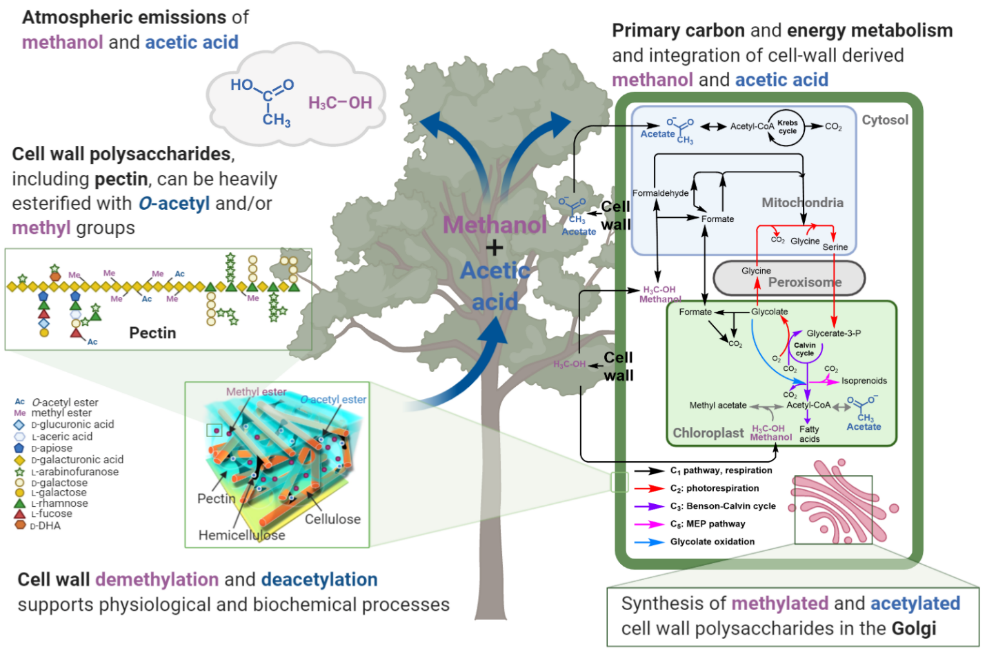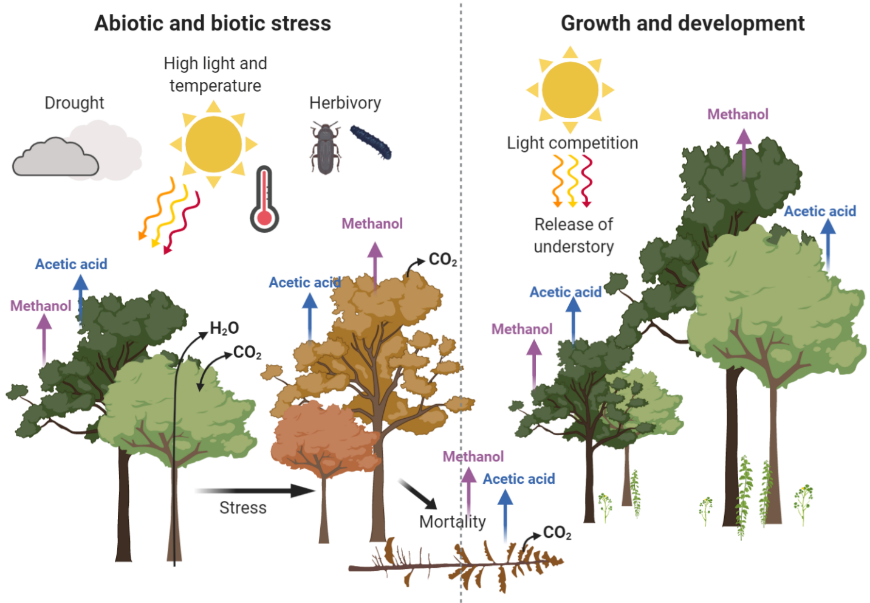The Science
Terrestrial ecosystem dynamics, including carbon stocks and biosphere-atmosphere fluxes of carbon dioxide (CO2), water (H2O), and volatile organic compounds (VOCs) are dramatically changing in response to climate factors such as trends in surface warming and a higher frequency and intensity of large-scale droughts and associated insect infestation epidemics. Understanding the mechanisms that drive forest responses to climate change is vital for predicting how the structure and function of natural and managed ecosystems will react to environmental change including alterations in carbon and H2O cycling, and the ecosystem services and products provided. Therefore, understanding the underlying biochemical, physiological, and ecological processes including plant growth and development, abiotic and biotic stress responses, mortality, and ecological succession and forest recovery are critical for accurately predicting the future of forest structure and function.
The Impact
We highlight cell wall-derived emissions of methanol and acetic acid, along with associated changes in cell wall structure and function as a common thread among the processes that underlie ecosystem responses to climate change. Thus, interdisciplinary studies linking cell wall biochemistry and metabolism with plant physiology and biosphere-atmosphere gas exchange will lead to better predictive understanding of the mechanisms through which cell wall esters facilitate forest response to climate extremes. Of particular interest are high latitude forests responding to rapid warming through expansion of deciduous broadleaf trees and commensurate declines in evergreen conifer trees. These distinct plant functional types vary in their leaf phenological cycles and cell wall composition, with deciduous trees undergoing seasonal leaf emergence and senescence while conifer trees retain their needles over the winter months. This may impact the timing, spatial distribution, and magnitude of biosphere-atmosphere fluxes of VOCs, CO2, and H2O in such changing forests in the future.
Summary
While little is known about the functions of cell wall ester modifications in trees, evidence from model plant systems like Arabidopsis thaliana suggests that they may be highly dynamic, playing central roles in cell growth, tissue development and function, participating in sensing and signaling pathways involved in cell wall remodeling in response to stress, and integrate into primary C1-3 metabolism. Although the reservoirs and fluxes of carbon through acetylated and methylated cell wall polysaccharides are potentially large, they remain poorly characterized. Methanol and acetic acid products of cell wall de-esterification may integrate whole plant metabolism by being transported over large distances within the plant via the transpiration stream and extracellular air space and enter central metabolism in distant tissues, or be emitted into the atmosphere as gases. Moreover, cell wall-derived methanol and acetic acid may be intimately involved in signaling and immune responses as an essential component of environmental plant monitoring systems; changes in cell wall esters during stress induce signaling via damage-associated molecular patterns, which in turn activate immunity responses. This link is mediated by the role of cell wall esters in central metabolism and plant sensing and signaling pathways involved in cell wall structural remodeling and “green immunity”.


Figure 2. Acceleration of forest dynamics and biosphere-atmosphere interactions associated with cell wall-derived methanol and acetic acid emissions under future predictions in surface warming, droughts, and biotic stress.
Contact: Kolby Jardine, Lawrence Berkeley National Lab, kjjardine@lbl.gov
Funding
This material is based upon work supported by the U.S. Department of Energy (DOE), Office of Science, Office of Biological and Environmental Research (BER), Biological System Science Division (BSSD), Early Career Research Program (FY18 DOE National Laboratory Announcement Number: LAB 17-1761), Topic: Plant Systems for the Production of Biofuels and Bioproducts, under Award number FP00007421 to Lawrence Berkeley National Laboratory.
Publications
R.A. Dewhirst, J.C. Mortimer, K.J. Jardine, (2020) Do cell wall esters facilitate forest response to climate?, Trends in Plant Science.